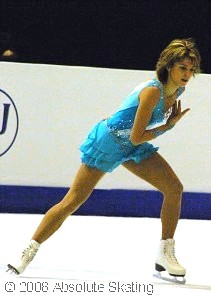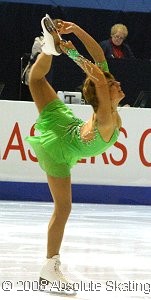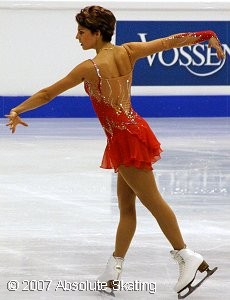Júlia Sebestyén: "I want everyone to see what I'm capable of"
 By Titanilla
Bod
Photos © Absolute
Skating
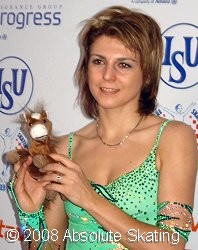 J├║lia
Sebesty├ęn, the
2004 European Champion from Hungary, had a succesful season
with a brilliant 4th place at the European Championships,
and despite messing up the short program and having to start
in the last group at the World Championchips in Sweden, she
managed to fight back in the long program, ending up in the
11th place. Just outside the top 10 maybe, but still a great
accomplishment. The ladies' competition in G├Âteborg ended
sooner than usual ┬ľ the skaters had Friday and Saturday off.
So that's the first we asked about.
J├║lia
Sebesty├ęn, the
2004 European Champion from Hungary, had a succesful season
with a brilliant 4th place at the European Championships,
and despite messing up the short program and having to start
in the last group at the World Championchips in Sweden, she
managed to fight back in the long program, ending up in the
11th place. Just outside the top 10 maybe, but still a great
accomplishment. The ladies' competition in G├Âteborg ended
sooner than usual ┬ľ the skaters had Friday and Saturday off.
So that's the first we asked about.
Compared to the usual time schedule, you had your competition earlier in G├Âteborg ┬ľ on Wednesday and Thursday. Were you glad to finish your competitions earlier than you are used to?
I felt like as if it was the weekend. On the day of the LP I felt as if it was Saturday. I had my usual pre-competition schedule. I arrived two days before the competition, so there wasn't any difference. The only weird thing was that we finished the competition and there were still two more days we could spend in G├Âteborg.
How do you spend the days before the competition? When do you start thinking about your programs?
I always arrive in the host city two days before the competition to avoid spending too much time with only getting stressed. We saw in G├Âteborg that almost all the men came on Monday, although they had their SP on Friday. I guess it was force of habit. But it's not too good to spend so many days at the event before the competition. You have less ice time, and you are getting more excited. If I'm getting prepared at my home rink, despite thinking of the competition I'm quite calm. I just feel only on the day of the competition that this is THE day. I'm not really excited before the competitions. The most difficult moment is when you stand on the ice and you know that you have to skate right now.
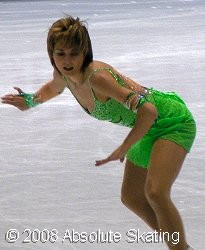 It's
widely known that you never watch your rivals skating. When
did you develop this habit?
It's
widely known that you never watch your rivals skating. When
did you develop this habit?
Since I was young, I have never watched the skater right before me. On one hand, not to get distracted ┬ľ whether she skates good or bad, I still have to do my best. It doesn't make me happy if someone bombs. It doesn't help at all if I mess up my program as well. The most important thing is to focus only on myself. And I also have to say that I can easily get tired when watching the performance of the others. If I went to the rink at the beginning of the competition, watched my rivals and then started to warm up, I would already be very tired.
The event in G├Âteborg was your 11th World championships. Have you been thinking about your first one during this week?
Not really. When talking about years, I always recall the Europeans in 1995 in Dortmund ┬ľ I was 13 back then. I didn't even really realise it was a Europeans. I remember when I finished second at the Hungarian Nationals behind Krisztina Czak├│, I was told: "Juli, you can go to the Europeans." And I thought: "OK, so I can go to another competition." I didn't really know what it took, I was just amazed at how many spectators were at the rink. When looking back, this is the competition I always recall.
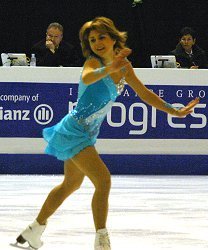 What
do you like more in this sport: to compete or to entertain
the crowd?
What
do you like more in this sport: to compete or to entertain
the crowd?
Both. I just love skating. I often hear why I'm so nervous, it can be seen. However, inside I know how much I can do on the ice at the practice sessions, and now there is the chance to show all this to the fans. I want everyone to see what I'm capable of, how nice jumps I have, that my spins have improved. Because it's not enough to skate just for myself in training. I don't like when I hear that I'm nervous. Of course, everyone is a bit excited, but I don't feel like: "Oh, my God┬ů" I have gone through many hard times. In the season 1996/97 I broke my leg twice. I had to overcome all this. I also had a very tough period after the 2006 Olympics. It's very difficult to get out of these and then just to stand on the ice and do a flawless program. Maybe that's why some people said I'm not a good competitor. But when I was a little girl and attended junior competitions, I never failed, I always did all my jumps, so I wouldn't say I'm such a bad competitor. Moreover, I landed the triple lutz for the first time at the age of 13 ┬ľ at the practice I fell, but at the competition I landed it properly.
You mentioned the hard times, what helped you in such situations?
I always had a coach by my side and he always supported me. After 2006 I changed coaches and now I'm working with Gurgen Vardanjan again. We were working mainly on the technical side of the skating, correcting some wrong habits. He always strengthened in me that I'm a good skater, I can do it and I have to believe in myself. And of course, my family supports me as well. It was very important to overcome the troubles. I also have a sports psychologist - at first I worked with Márta Vura, now with Ágota Budai.
 
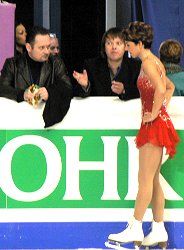
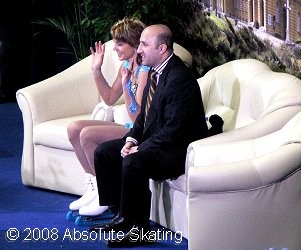
How can a psychologist help?
A psychologist is not enough to be successful. It's necessary to have good off-ice trainings, proper technique for the jumps, and good condition. The psychologist can make easier the situation when you have to skate in front of thousands of people. There might me different situations, maybe I have to skate in the best group and I have to handle that big pressure, or maybe I have to fight from lower positions, like in G├Âteborg. A psychologist can help you to be able to skate your best without your legs trembling. Of course, it's very difficult and it's a long process. You need lots of experience. If you skate well from competition to competition, it gives you self confidence.
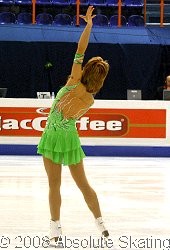 What
are you thinking about when you go on to the ice? Or are you
just on auto-pilot?
What
are you thinking about when you go on to the ice? Or are you
just on auto-pilot?
Right before my programs I'm focusing only on certain elements. I try not to think of my program as of a four-minute LP, because it seems awfully long. I always focus only on the next element. If this works, I can skate a flawless program. If I start to think of the previous element, I usually make a mistake. Even if I fall or do something perfectly I have to forget it for the moment.
You said you landed the triple lutz for the first time at a competition, but during the last few seasons the triple lutz was your unlucky jump.
Yes, I had a period when I permanently fell on the lutz and maybe I wanted to land it too much, I got cramped, because I wanted to show so much that I know that jump! Luckily, in the last few events I had a steady lutz again, even two of them in the LP! Everyone can see that I can jump the lutz!
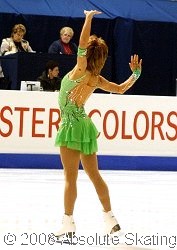 You
have exceptionally high jumps. Have you ever tried any quad
like the Japanese ladies do?
You
have exceptionally high jumps. Have you ever tried any quad
like the Japanese ladies do?
Once I tried to jump a triple axel, but I think it's not really worth it in the new scoring system. The Japanese are trying these jumps, and can earn some extra points for them but if I do my program perfectly, I could have points near them. I have landed a triple-triple combination, even tried it at a competition. I think I would be able to make it more secure. But even with my current programs, if performed well, I can earn many, many points. I won't start to work on a quad! (laughs)
You have competed a lot in the old and also in the new system. What do you think about them?
It was very hard when they changed the rules. It meant a lot of extra work for me. It took about two years to understand the new system completely. For example, learning a new spin was as difficult as learning a new jump. Those difficult combination spins need as much energy as a jump. I had to work on a spin for half a year to make it a "usual spin" and not an extremely tiresome element. When the new system came we had to learn many new elements, so it's more difficult for the skaters. However, it still has it subjectivity, because there are still the component scores. Also, it is very important to have a good technical controller. If they don't like you, you can lose many points.
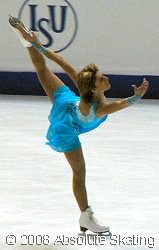 Don't
you think that due to the new system all the programs are
very similar?
Don't
you think that due to the new system all the programs are
very similar?
It's a fact that both in the SP and LP almost everybody has the same spiral sequence. Many spins are very similar, too┬ů
What kind of programs do you like to make? The fans usually appreciate quicker music...
It's more difficult to skate to quick music, maybe that's why lots of skaters rather choose slower pieces. For example there are so many rules concerning the step sequence that it's hard to skate it to a quick music. I like to have both slow and quick part in my music. It's easier to have your jumps in the slower part, because you can go in your own rhythm into a jump. But the quick part is needed because it spices up the whole program, also in the eyes of judges.
When do you think you were in top form in your career?
As for competitions it was year 2004. I skated very good LPs and had very good results. But concerning my self-confidence and jump technique I can say that I was in top form at the 2008 Europeans and Worlds. Before a jump takeoff I haven't even thought of the possibility of the failure, I was so confident. All my triples were steady, even the triple loop, although it wasn't in my programs.
 
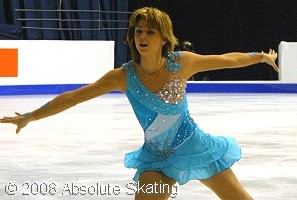
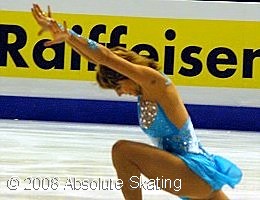
You mentioned 2004 ┬ľ that year the Europeans were in Budapest and you became European champion. It must have been a fantastic experience, but also a big pressure to skate in your home country.
I still think about it a lot. I have the tape and when the LP starts, even the commentators couldn't breathe. I really don't know how I managed to deal with such a pressure. I was so focused and the fact I did well at the previous competitions also helped. I believed in myself, I believed I could make it. It also gave me strength when I skated at home. I'm very happy that I could take this chance, because, if we take a look at the big competitions, the home competitors can't always do their best.
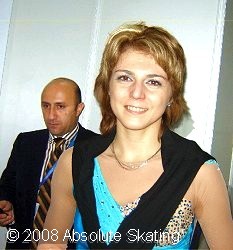 Irina
Slutskaya wasn't present at those Europeans ┬ľ were you
happy about it or you think you would beat even her?
Irina
Slutskaya wasn't present at those Europeans ┬ľ were you
happy about it or you think you would beat even her?
Before the competition I wasn't thinking about my possible placement. In the previous year I was third at the Europeans, but I didn't think of any medal. I wanted to get a good result, but never thought about a placement. I focused on my performance, and probably this was the main reason that I could skate a good program. I read the newspapers retrospectively ┬ľ before the competition I read nothing. We even traveled to Sweden and came back to Hungary only a few days before the Europeans, to avoid that enormous pressure ┬ľ and when I read the newspapers I was surprised that the people expected my victory that much, although the field was very strong even without Slutskaya. If she had been there, maybe I wouldn't have won, but she wasn't there and I'm glad that I managed to win. (smiles)
Do you sometimes read the skating discussion boards on the internet?
I have looked at them a few times, but now I don't read them. If someone criticizes me in a good manner, I can take it, but on the discussion boards there are many anonymous people who don't really know what skating is about, they don't know what's going on in the background, they can criticize people but they don't notice the success┬ů If someone has a good result, they say it was only a coincidence, but if someone fails, they are very harsh and unfair┬ů I'm listening to opinions of people I admire, of course I want to be loved by fans but I don't care about evil people.
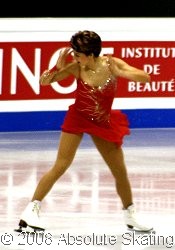 Do
you know that some people call you Granny on the forums?
Do
you know that some people call you Granny on the forums?
I have heard about it, but I think everyone is as old as they feel. I think I have never been in a better physical shape than now. Age is not everything. I was fourth at the last Europeans and eighth in G├Âteborg, and I placed ahead of the former world champion Kimmie Meissner. I think it proves age doesn't matter.
You speak as if you were so old, although you are only 27. You have been competing for so many years, maybe that's why it seems you have been around for ages.
I was thirteen at my first Europeans. Today you are not allowed to compete at senior Europeans if you are so young. People saw me many times, that's why they might get an impression that I'm old. Michelle Kwan started also at very young age and had a long career and someone also told about her: "Is she still competing? Oh, she should retire┬ů" Although she was only 22!
How do you see the future of figure skating in Hungary?
I hope that sooner or later we can bring up skaters who could be at the top. We were in very difficult situation when the Budapest Arena burned down in a fire. Many young skaters quitted skating. Luckily after the 2004 Europeans kids became interested in figure skating again. We need a few years until we will have international competitors, but I believe there are some skilled kids. I also hope they will get enough support, because the sport is in the difficult situation.
If you had children, would you want them to skate?
It's hard to say, you can't
force it. If they liked it, if they wanted to do it, it might
be possible.
It was a pleasure meeting such a cheerful and confident J├║lia and surely hope she will maintain this attitude in the new season. Her new programs to Secret Garden and Bond certainly hold much promise. Good luck J├║lia, and we hope you have fun and enjoy to watch the Summer Olympics, to cheer on the Hungarian Athletes!
